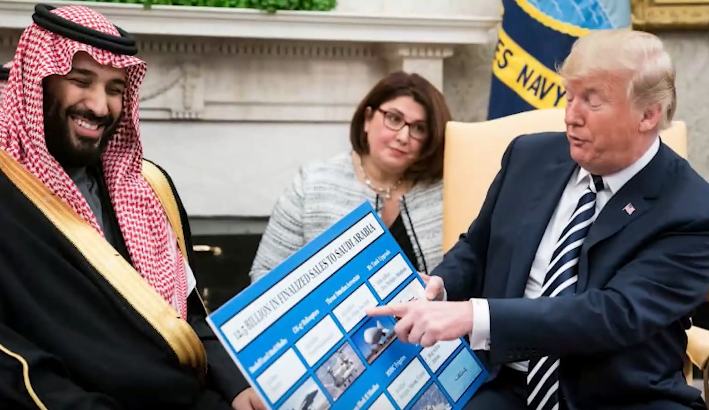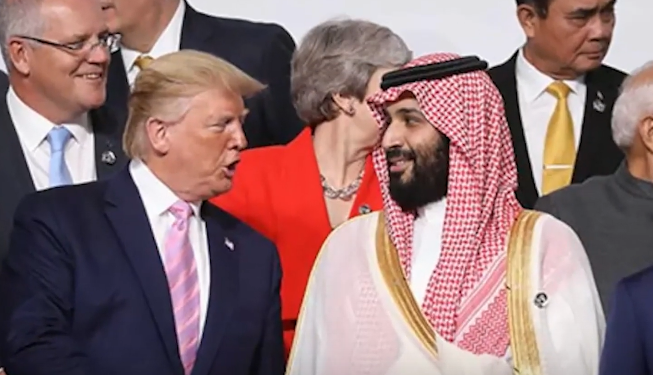The political tides are shifting once more in Washington as former President Donald Trump’s latest policy maneuvers dominate headlines. With an upcoming visit to Saudi Arabia planned and immigration tensions escalating within U.S. borders, Trump’s administration faces a dual-front scrutiny that could define his legacy—and potentially his political comeback. The spotlight has zeroed in on two critical fronts: Saudi Arms Deal, massive arms package for Saudi Arabia and a sweeping crackdown on immigration policy. But why now?
Public concern, legal challenges, and global reactions signal more than a routine power play. This is a flashpoint in American political history, where foreign diplomacy and domestic control collide in a high-stakes chess match.

Trump’s Saudi Arms Deal Explained
A Look Inside the $100 Billion Package
At the heart of the controversy is a proposed arms deal with Saudi Arabia, rumored to be worth over $100 billion. This is not just a weapons transaction—it’s a geopolitical move loaded with implications. Reports suggest this package includes advanced aircraft, missile defense systems, and precision-guided munitions.
The timing of this proposal, set to be announced during Trump’s anticipated visit to the Kingdom in May, raises eyebrows. Many critics are questioning whether this move prioritizes strategic interests over ethical responsibility, especially in a region marked by decades of volatility.
Historical Ties Between the US and Saudi Arabia
The U.S.–Saudi alliance isn’t new. Since the 1940s, the two nations have maintained a strategic partnership rooted in oil, security, and regional stability. However, the post-9/11 era, the Yemen conflict, and the murder of journalist Jamal Khashoggi have strained this bond. Trump’s overtures toward Saudi Arabia revive this old alliance but under more contentious circumstances.
Geopolitical Ramifications in the Middle East
This arms deal may shift the military balance in the Middle East. Critics fear it will embolden Saudi Arabia’s aggressive regional policies, especially in Yemen, where a humanitarian crisis is already dire. Moreover, the deal could trigger an arms race, challenging efforts for regional peace.
Congressional Review: A Legal Hurdle
U.S. law mandates that significant arms sales be reviewed by Congress. With bipartisan opposition gaining traction, this proposal might face delays or even rejection. Lawmakers argue that the deal could compromise America’s commitment to ensuring Israel maintains a “Qualitative Military Edge,” a cornerstone of U.S. policy in the region.
Impacts on U.S. Defense Contractors
On the flip side, defense giants like Raytheon and Lockheed Martin stand to benefit enormously. The economic incentives are clear, but at what cost? Are we trading global stability for profit margins?
Israel’s Security Edge and Regional Balance
Any arms sale of this magnitude inevitably draws attention to Israel’s defense. Maintaining its qualitative edge is not just political—it’s law. This proposal forces a reckoning: can the U.S. continue to arm allies without undermining others?

Public and Political Reactions
Domestic Reactions to the Arms Deal
Public opinion remains split. Supporters tout economic gains and strategic alignment against Iran, while critics warn of fueling authoritarianism and destabilizing the region further. Think tanks and human rights organizations are already sounding alarms.
Global Community’s Take
Internationally, this move is being watched closely. European allies express concerns, especially those promoting arms embargoes on Saudi Arabia. Meanwhile, rival powers like Russia and China may capitalize on any diplomatic missteps.
Bipartisan Pushback and Concerns
Perhaps most surprising is the bipartisan criticism emerging in Congress. Democrats and Republicans alike are questioning the wisdom of empowering a regime with a questionable human rights record. This could be one of the rare moments of political unity in today’s polarized climate.
Immigration Policies Face Scrutiny and Legal Challenges
Immigration continues to be a highly debated topic, with recent reports highlighting various aspects of the administration’s policies. A bipartisan group of states is reportedly challenging the administration’s immigration policies, raising concerns about their legality and impact. Additionally, reports detail increased scrutiny at the US border and ports of entry, outlining what rights immigrants and citizens have when interacting with federal agents. Concerns have also been raised by a state’s attorney general regarding the safety of detainees on ICE Air flights. Furthermore, a non-profit organization is reportedly struggling to maintain support for refugees due to funding cuts implemented by the administration. These various developments underscore the ongoing complexities and controversies surrounding immigration policies in the United

Inbound Links:
Outbound Links: